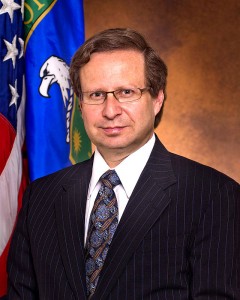 Der US-amerikanische theoretische Physiker Steven Koonin gilt als engagierter Befürworter der Suche nach alternativen Energiequellen und wurde von Barack Obama 2009 zum zweiten Unterstaatssekretär im Energieministerium ernannt. Koonin ist Mitglied der American Association for the Advancement of Science, der American Academy of Arts and Sciences und seit 2010 der National Academy of Sciences. Er war in verschiedenen Beratungsgremien des Department of Energy (DOE), des US Verteidigungsministeriums und der National Science Foundation. Heute ist Koonin Direktor des Center for Urban Science and Progress an der New York University.
Der US-amerikanische theoretische Physiker Steven Koonin gilt als engagierter Befürworter der Suche nach alternativen Energiequellen und wurde von Barack Obama 2009 zum zweiten Unterstaatssekretär im Energieministerium ernannt. Koonin ist Mitglied der American Association for the Advancement of Science, der American Academy of Arts and Sciences und seit 2010 der National Academy of Sciences. Er war in verschiedenen Beratungsgremien des Department of Energy (DOE), des US Verteidigungsministeriums und der National Science Foundation. Heute ist Koonin Direktor des Center for Urban Science and Progress an der New York University.
Im Laufe seiner Karriere hat sich Steven Koonin auch intensiv mit den Klimawissenschaften auseinandergesetzt. Am 19. September 2014 überraschte nun der Obama-Vertraute die Öffentlichkeit mit einem längeren Artikel im Wall Street Journal, in dem er für mehr Ausgewogenheit und weniger Alarmismus in den Klimawissenschaften plädiert. Einen irgendwie gearteten Konsens gäbe es in den Klimawissenschaften nicht, erklärt Koonin darin. Damit widerspricht Koonin ausdrücklich der klimaalarmistischen Linie des US-Päsidenten, der die wissenschaftlichen Grundlagen als geklärt annimmt. Mit seiner klaren Positionierung setzt Koonin die Reihe prominenter Wissenschaftler fort, die sich klar gegen die Dramatisierung der Klimagefahr aussprechen und eine Rückbesinnung auf eine ergebnisoffene wissenschaftliche Diskussion fordern.
Im Folgenden einige Auszüge aus Koonins bemerkenswertem Essay (die deutsche Übersetzung des Gesamttextes finden Sie auf EIKE):
Climate Science Is Not Settled
We are very far from the knowledge needed to make good climate policy, writes leading scientist Steven E. KooninThe crucial scientific question for policy isn’t whether the climate is changing. That is a settled matter: The climate has always changed and always will. Geological and historical records show the occurrence of major climate shifts, sometimes over only a few decades. […] The crucial, unsettled scientific question for policy is, „How will the climate change over the next century under both natural and human influences?“ […] Even though human influences could have serious consequences for the climate, they are physically small in relation to the climate system as a whole. For example, human additions to carbon dioxide in the atmosphere by the middle of the 21st century are expected to directly shift the atmosphere’s natural greenhouse effect by only 1% to 2%. Since the climate system is highly variable on its own, that smallness sets a very high bar for confidently projecting the consequences of human influences. […]
A third fundamental challenge arises from feedbacks that can dramatically amplify or mute the climate’s response to human and natural influences. One important feedback, which is thought to approximately double the direct heating effect of carbon dioxide, involves water vapor, clouds and temperature. […] But feedbacks are uncertain. They depend on the details of processes such as evaporation and the flow of radiation through clouds. They cannot be determined confidently from the basic laws of physics and chemistry, so they must be verified by precise, detailed observations that are, in many cases, not yet available. […] We often hear that there is a „scientific consensus“ about climate change. But as far as the computer models go, there isn’t a useful consensus at the level of detail relevant to assessing human influences. […] The models differ in their descriptions of the past century’s global average surface temperature by more than three times the entire warming recorded during that time. Such mismatches are also present in many other basic climate factors, including rainfall, which is fundamental to the atmosphere’s energy balance. As a result, the models give widely varying descriptions of the climate’s inner workings. Since they disagree so markedly, no more than one of them can be right. […]
Any serious discussion of the changing climate must begin by acknowledging not only the scientific certainties but also the uncertainties, especially in projecting the future. Recognizing those limits, rather than ignoring them, will lead to a more sober and ultimately more productive discussion of climate change and climate policies. To do otherwise is a great disservice to climate science itself.
Ganzen Artikel im Wall Street Journal lesen.
Foto von Steven Koonin: Gemeinfrei.